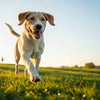How to Get My Old Dog to Gain Weight: A Comprehensive Guide for Concerned Pet Owners
- Houndsy
Table of Contents
- Introduction
- Understanding Weight Loss in Senior Dogs
- Nutritional Strategies for Weight Gain
- Additional Tips for Encouraging Weight Gain
- The Importance of Veterinary Care
- Conclusion
- FAQ
Introduction
Have you ever watched your once-energetic dog transform into a shadow of their former self? It's heart-wrenching to see our beloved companions lose weight as they age. According to recent studies, nearly 40% of senior dogs experience weight loss, often due to a combination of health issues and natural aging processes. This statistic is alarming for pet owners who want to ensure their furry friends maintain a healthy lifestyle in their golden years.
Understanding how to help our aging dogs gain weight is crucial for their overall well-being. In this blog post, we'll explore the many reasons why your older dog may be losing weight, what you can do to help them regain those lost pounds, and how to ensure they stay healthy and happy. Our aim is to equip you with actionable insights and strategies that you can implement today.
Throughout this article, we’ll cover:
- The common causes of weight loss in senior dogs
- Signs that your dog may need to gain weight
- Nutritional strategies to enhance your dog’s diet
- Additional tips for encouraging weight gain
- The importance of veterinary care
As we navigate through these topics, we invite you to reflect on your own pet's eating habits and health. By the end of this post, we hope you'll feel empowered to take proactive steps to help your furry companion regain their vitality.
Understanding Weight Loss in Senior Dogs
Common Causes of Weight Loss
As our dogs age, their bodies undergo numerous changes, which can lead to weight loss. Here are some common causes that may contribute to this issue:
- Dental Problems: Older dogs often experience dental issues such as gum disease or tooth loss, which can make eating painful. If your dog seems to shy away from their food, it might be time for a dental check-up.
- Chronic Illness: Conditions such as kidney disease, diabetes, and cancer can lead to significant weight loss. These diseases can affect a dog's appetite and their ability to absorb nutrients.
- Reduced Metabolism: Just like humans, dogs' metabolisms slow down with age. This can lead to changes in appetite and energy levels, potentially causing weight loss.
- Stress or Anxiety: Changes in their environment, such as moving to a new home or the loss of a companion, can stress dogs, leading to a decreased appetite.
- Changes in Diet: If you've recently changed your dog's food, they may not be getting the nutrients they need, or they might not like the new flavor.
Signs That Your Dog Needs to Gain Weight
Is your dog’s weight loss concerning? Here are some signs to watch for:
- Visible ribs or spine
- Decreased energy or lethargy
- Changes in appetite (either increased or decreased)
- Behavioral changes, such as becoming withdrawn or anxious
- Loss of muscle mass, particularly in the hindquarters
If you notice any of these signs, it’s essential to consult with your veterinarian. They can help determine whether your dog needs to gain weight and explore any underlying health issues.
Nutritional Strategies for Weight Gain
Choosing the Right Diet
When it comes to helping your old dog gain weight, a nutritious diet is paramount. Here are some strategies for selecting the right food:
- High-Calorie Dog Food: Look for dog food formulated specifically for weight gain. These diets are often higher in protein and fat to help your dog gain weight without requiring larger portions.
- Fresh and Natural Ingredients: Incorporating fresh foods like lean meats, vegetables, and high-quality grains can provide your dog with the necessary nutrients and stimulate their appetite.
- Wet Food vs. Dry Food: Canned food is often more palatable for dogs, especially those with dental issues. It’s also higher in moisture, which can help with hydration.
- Small, Frequent Meals: Instead of one or two large meals, consider feeding your dog smaller portions multiple times throughout the day. This can improve their digestion and encourage them to eat more.
Supplements and Treats
In addition to their regular meals, you can enhance your dog's diet with supplements and treats:
- High-Calorie Treats: Things like peanut butter, yogurt, and cottage cheese can be excellent sources of extra calories when given in moderation.
- Nutritious Additives: Consider adding supplements such as fish oil for healthy fats, which can improve appetite and overall health.
Incorporating the Houndsy Kibble Dispenser
To further elevate your dog feeding experience, we recommend using the Houndsy Kibble Dispenser. Our innovative design allows for perfect portion control, ensuring that your dog receives the right amount of food every time. The dispenser’s standing height crank makes feeding convenient, reducing the strain on your back while enhancing the feeding ritual with its stylish, mid-century modern design.
Additional Tips for Encouraging Weight Gain
Monitoring and Adjusting
It’s essential to keep a close eye on your dog’s weight and adjust their diet as needed. Regular weigh-ins can help you track their progress. If your dog isn’t gaining weight after implementing dietary changes, consult your veterinarian for further advice.
Encouraging Exercise
While it may seem counterintuitive, regular exercise can help build muscle mass, which is beneficial for weight gain. Here are some tips:
- Short, Gentle Walks: Encourage light exercise to stimulate appetite without exhausting your dog.
- Playtime: Engaging in play can help boost their mood and encourage them to eat.
Creating a Comfortable Feeding Environment
Make mealtime pleasant for your dog:
- Quiet Space: Ensure they have a calm environment free from distractions during meals.
- Routine: Establishing a feeding routine can help your dog feel more secure and encourage them to eat.
The Importance of Veterinary Care
Regular veterinary check-ups are crucial for senior dogs. Not only can your vet help identify underlying health issues contributing to weight loss, but they can also recommend specialized diets tailored to your dog’s specific needs.
Key Takeaways:
- If your dog has lost 10% or more of their body weight, it’s essential to consult a veterinarian.
- Regular exams will help establish benchmarks for their health, making it easier to identify changes.
Conclusion
Helping your old dog gain weight is a multifaceted approach that involves assessing their health, adjusting their diet, and ensuring they have a supportive feeding environment. By taking proactive steps and consulting with your veterinarian, you can significantly improve your furry friend’s quality of life. Remember, every dog is unique, so tailoring a plan that meets your dog's specific needs is crucial.
As we wrap up this comprehensive guide, we encourage you to take action today. Consider implementing the tips discussed here, and don't forget to explore the Houndsy Kibble Dispenser to make feeding time easier and more enjoyable for both you and your dog.
FAQ
Q: How can I tell if my dog is underweight? A: A dog is generally considered underweight if you can easily see their ribs and spine. Consult a veterinarian for a professional assessment.
Q: What should I feed my old dog to help them gain weight? A: Look for high-calorie, nutrient-dense dog food, and consider adding fresh foods and high-calorie treats to their diet.
Q: Can I give my dog human food to help them gain weight? A: Yes, you can give your dog small amounts of human food, like lean meats or vegetables, but always ensure these foods are safe for dogs.
Q: How often should I feed my senior dog? A: Consider feeding smaller, more frequent meals throughout the day to help boost their appetite and nutrient intake.
Q: When should I consult a veterinarian about my dog's weight? A: If your dog has lost 10% or more of their body weight, or if you notice changes in their appetite or energy levels, it’s time to see a vet.













